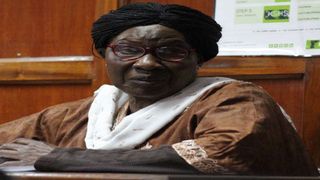
Grace Wakhungu at a Nairobi court on November 13, 2019 over a Sh297 million maize scandal.
| File | Nation Media GroupNews
Premium
Evans Monari’s death delays appeal in Grace Wakhungu’s Sh297m graft case
The High Court has allowed businesswoman Grace Wakhungu, who is fighting a jail term of 69 years for theft of Sh297 million from a state agency, to reconstitute her legal team following the death of lawyer Evans Monari.
Justice Esther Maina has granted Ms Wakhungu 21 days to rearrange the team after being informed that Monari was a critical member of the group in arguing an appeal that is challenging the decision of the lower court to convict Ms Wakhungu for corruption.
Ms Wakhungu was sentenced last year alongside her business associate, Sirisia MP John Waluke, for a fraudulent maize supply deal at the National Cereals and Produce Board (NCPB).
Justice Maina heard that although the other two lawyers -- Duncan Okubasu and Paul Muite -- who are leading the team, were ready to proceed with the hearing of the appeal, there was need to grant them time to regroup and put their house in order. The appeal had been called for fixing of a hearing date.
Formal application
During the proceedings, Mr Waluke asked the court to release his passport so that he can travel to the United States of America on parliamentary duty.
His lawyer Elisha Ongoya told the court that the MP is scheduled to travel on November 5 and return on November 18.
But the court directed him to file a formal application after the Director of Public Prosecutions opposed the oral request. The application will be heard this Friday.
Mr Waluke and Ms Wakhungu are out of prison on bonds of Sh20 million and Sh30 million respectively, pending hearing and determination of their appeal.
The two, who are also directors of their trading company Erad General Supplies and Contracts Ltd, were sentenced in June last year by the Anti-Corruption Court for the theft of Sh297 million from the state corporation in 2009.
The trial court gave them an alternative of paying a combined fine of Sh2 billion. Evidence at the trial court indicated that the two and their trading company received payment from NCPB based on forged documents after pretending that they had bought maize from Ethiopia for supply to the cereals board.
They also lied that they had incurred losses by storing the commodity. But no maize was bought, hence there was nothing to store, the trial court found.
Aggrieved by both the conviction and sentence, they moved to the High Court, citing 35 grounds of appeal for Mr Waluke and 18 grounds for Ms Wakhungu.
For his part, Mr Waluke argues that the trial magistrate convicted him despite there being a manifest absence of proof of the prosecution’s case to the required standards by law.
He says there was no theft of public funds and that he was erroneously convicted for payments made pursuant to an order of a court superior to that of the trial court.
The 60-year-old retired soldier also argues that he was convicted without proof of any role played by him in the disputed transaction.
"The trial court manifestly shifted the burden of proof from the prosecution to the appellant. He was subjected to undignified, harsh and unlawful sentence which is not contemplated in a democratic society where sentences are meant to be rehabilitative," reads his appeal.
He questions why the trial magistrate failed to consider evidence of the case investigating officer who testified that he did not find any undue influence in the signing of tender contracts for supply of the maize.
Distortions of evidence
He avers that the trial court was not independent and impartial as it selectively recorded evidence leading to major distortions of evidence.
"The court did not appreciate that the transaction leading to the (criminal) charges against him commenced through arbitration proceedings," he says.
"There were material contradictions in the prosecution’s evidence and the court made wrong inferences based on misapprehension of the facts pertaining to the invoices presented, taking into account maize, the subject of the contract in question, is a perishable commodity," argues Mr Waluke.
Ms Wakhungu, 80, also describes the lower court's decision as exorbitant and inappropriate because there was no forensic evidence of a document examiner produced by the prosecution to establish that the invoices were falsified.
Her lawyer, Mr Okubasu, wants the court to establish her suitability to stand trial in the first place, considering that her conviction was based mainly on the contradictions she gave to the trial court.
The appeal will be heard on February 15, 2022.





